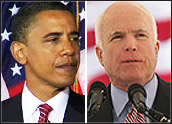
A week — even a day — can make a world of difference in a presidential election. Witness the fact that nearly right up to the minute the still-unfolding Wall Street crisis came to a boil, the issue getting the most play in campaign speeches was oil prices. There was even a fair amount of speculation that one of John McCain’s primary motives for placing Sarah Palin second on his ticket was her geographic proximity to the Alaskan oil fields and her support of the effort to allow further exploration of them.
Despite the fact that the issue du jour has shifted, however, technology — and its impact on a host of hot-button topics — has kept its front-and-center position in many discussions of presidential politics, the candidates and America’s future. For starters, it’s worth noting that one of the most important technology matters in November likely will be the election process itself.
Voting Technologies
The last two presidential elections, in 2000 and 2004, were two of the closest in American history. Not surprisingly, this fact alone has generated intense interest in how votes are collected, tallied and recorded. In the aftermath of those elections, state governments have come under intense pressure to streamline voting operations, and they are looking to technology both to improve accuracy and lower the costs of running elections.
Along with the advent of computerized voting, however, have come questions about exactly how software-based elections can be monitored and verified. Many groups advocate establishing a paper trail, whereby individual votes can be legitimized in hard copy. Barack Obama favors ballot receipts verified by individual voters; he cosponsored the “Ballot Integrity Act of 2007.” John McCain has not made a clear statement on the particulars of election process reform.
Still, public discourse on whether polling places should use optical scanners, touch-screen systems, or other computer technology to gather and count votes largely misses the central point, according to Thad Hall, assistant professor of political science at the University of Utah.
“Elections are an administrative activity,” Hall told TechNewsWorld. “We keep focusing on the shiny toys instead of procedures.”
It is the procedures themselves — like keeping a careful chain of custody of ballots and voting machines of whatever kind — that make the difference between a well-run election and a botched one.
Because presidential elections draw voters who may not vote during the intervening four years, it is likely there will be problems in various locations across the country this November, Hall predicted. Exactly where those problems occur, though, could be crucial to election outcomes.
“In Hawaii, they could lose a bunch of Obama ballots and it wouldn’t make any difference,” he quipped. That’s because states with a clear blue or red leaning will remain so, despite any implementation issues with voting technology.
“If you’re an election official in any battleground state — Florida, Ohio, or New Mexico, for example — and you screw up, it’s going to be a big deal,” said Hall.
Consequences of a technology glitch in states where the race for electoral votes may come down to thousands, or just hundreds, of ballots could include legal action by one or both campaigns and, more damaging, long-term loss of voter confidence in the election process itself.
Any information technology professional will be familiar with the advice Hall has for officials looking to avoid technology-related problems in November.
“The key is to think through the procedures and training,” he noted. “If IBM was implementing a computer system for a company, they would never turn to the company and say, ‘This system is going to fix everything for you, and don’t worry about the training or procedures part, like the security of your data.'”
Energy Technologies
The mechanics of the election aside, among the more prominent technology-related issues included in stump speeches is how the U.S. will continue to feed its voracious energy appetite. Offshore drilling may be getting the most attention, but alternative energy sources feature prominently in both presidential candidates’ plans for addressing the rising cost of oil.
However, irrespective of Congress’ loosening of restraints on offshore oil drilling, “new oil reserves will be slow in coming,” Don Challman, associate director and general manager of the University of Kentucky’s Center for Applied Energy Research, told TechNewsWorld.
The future of energy use in the transportation arena, he asserted, will be much more contingent on making more efficient vehicles than on tapping new sources of oil.
Making those vehicles a reality remains an issue on which the federal government largely has dropped the ball, through both Democratic and Republican administrations, stressed Challman. “In my 30 years in the field,” he noted, “federal funds for this kind of research have been declining.”
By contrast, research on alternative energy technologies is exactly the kind of field in which the federal government should be playing a major role, he argued.
“This kind of research is high risk and very expensive,” explained Challman. “It needs leaders to get going, and then, eventually, it will be commercialized. It’s basic and applied research that will get these new kinds of vehicles going — then industry will do the ‘D’ part of R&D.”
Medical Technologies
In fact, the federal government funds a big percentage of all kinds of basic research in the United States. Another field of research getting political attention this election season is the use of embryonic stem cells. John McCain has changed his position on the topic of federal funding of scientific research using stem cells, according to the nonpartisan, nonprofit Web site ProCon.org.
As recently as May of 2007 in a Republican presidential debate in Simi Valley, Calif., McCain expressed support for grant projects involving stem cells and their potential use in treating serious illnesses such as diabetes and Parkinson’s disease. Since then, however, he has formally opposed the use of federal funds for research involving stem cells, according to the document, Human Dignity & the Sanctity of Life,” on his official campaign Web site.
Barack Obama, on the other hand, is a long-time supporter of research utilizing stem cells and related technologies. He cosponsored the “Stem Cell Research Enhancement Act of 2007.” Both candidates have pointed out that the stem cell lines that are the subject of the research funding debate already exist and would be destroyed if research programs were discontinued.
While the implications of the federal government’s attitude toward medical research using stem cells may not be grabbing headlines this week, it remains an important issue to voters. In fact, it was the most popular technology-related search term at the ProCon.org Web site during the period from July 1 through this week, site managing editor Kamy Akhavan told TechNewsWorld.
Overall, though, the subject ranked 25th in popularity among the 65 issues tracked by the site, indicating that perhaps voters are not as focused on this controversy as they were even six months ago.





















































